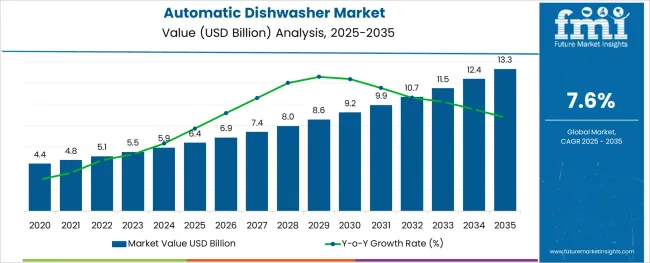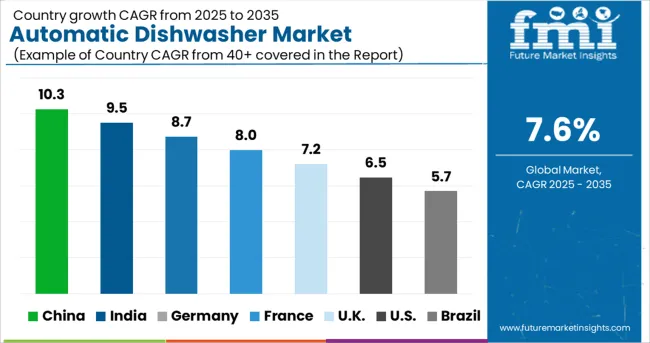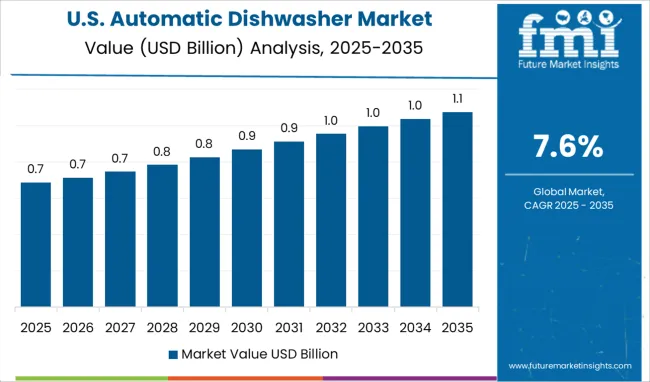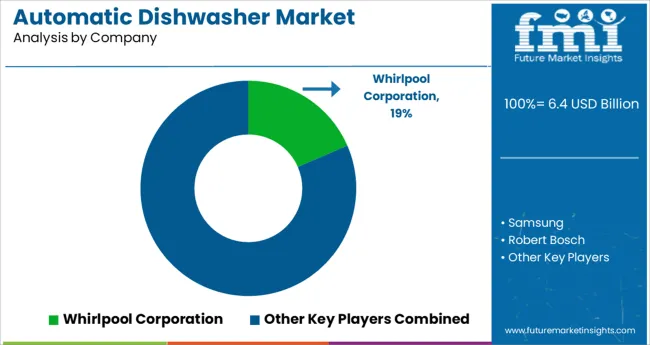The Automatic Dishwasher Market is estimated to be valued at USD 6.4 billion in 2025 and is projected to reach USD 13.3 billion by 2035, registering a compound annual growth rate (CAGR) of 7.6% over the forecast period.

The alginic acid market is undergoing consistent growth, propelled by rising demand from food processing, pharmaceutical formulations, and cosmetic applications. A growing focus on natural and sustainable ingredients in manufacturing processes has positioned alginic acid as a preferred biopolymer across industries.
The market is further supported by its diverse functional benefits, including water retention, gelling, and stabilizing properties, which make it indispensable in high-performance formulations. Increased regulatory acceptance of alginates as safe additives and the push towards cleaner labeling in food and personal care products have reinforced their adoption.
Ongoing innovation in extraction technologies and the utilization of algae as a renewable resource are paving the way for cost-effective production and expanded applications, ensuring sustained market expansion in the coming years.
The market is segmented by Product Type, Application, Capacity, and Sales Channel and region. By Product Type, the market is divided into Freestanding and Built-in. In terms of Application, the market is classified into Residential and Commercial. Based on Capacity, the market is segmented into 12 Place Setting, 4 Place Setting, 6 Place Setting, 8 Place Setting, and Other. By Sales Channel, the market is divided into Online Retailers, Wholesalers/Distributors, Multi-Brand Stores, Specialty Stores, Hypermarkets/Supermarkets, and Other Sales Channel. Regionally, the market is classified into North America, Latin America, Western Europe, Eastern Europe, Balkan & Baltic Countries, Russia & Belarus, Central Asia, East Asia, South Asia & Pacific, and the Middle East & Africa.
When segmented by salts, sodium alginate is expected to command 27.5% of the market revenue in 2025, marking it as the leading subsegment in this category. This leadership has been driven by its superior solubility, ease of incorporation into formulations, and versatility in a wide range of applications.
Its ability to form stable gels and maintain viscosity under varying conditions has made it highly sought after in both food and pharmaceutical sectors. Manufacturers have prioritized sodium alginate due to its consistent performance, cost-effectiveness, and regulatory acceptance, which have collectively strengthened its position.
The segment’s prominence has also been enhanced by its adaptability to evolving consumer preferences for plant-derived and sustainable ingredients, reinforcing its market share.
Segmented by end user industry, the food industry is projected to hold 33.0% of the market revenue in 2025, positioning it as the most prominent sector. This dominance has been shaped by the industry’s increasing reliance on alginic acid and its derivatives to deliver desirable textures, stabilize emulsions, and improve shelf life of processed foods.
As consumer demand for clean label and natural additives has intensified, the food sector has responded by integrating alginates into bakery, dairy, and confectionery products. Enhanced production efficiency and compliance with food safety standards have further encouraged widespread use.
The segment’s leadership has also been supported by product differentiation strategies where alginates contribute to premium quality and innovation, securing their role in modern food formulations.
When analyzed by functionality, thickening agents are forecast to account for 29.0% of the market revenue in 2025, establishing themselves as the dominant functional category. This preeminence has been underpinned by the growing need for consistent texture and viscosity in a wide array of end products.
Alginic acid’s natural origin and high efficiency in creating uniform, stable thickness without altering taste or color have solidified its appeal. The demand for thickeners in both edible and topical applications has expanded, with manufacturers leveraging its rheological properties to meet performance and regulatory requirements.
The functionality’s leading share has also been reinforced by the ability to deliver cost savings through lower dosages and its compatibility with other ingredients, securing its position as an indispensable component in formulation strategies.
According to Future Market Insights (FMI), the global automatic dishwasher industry is projected to expand at a CAGR of 7.6% between 2025 and 2035, in comparison to the 5.4% CAGR registered from 2020 to 2024.
The growing need for reducing labor costs and improving overall productivity across commercial kitchens and the increasing popularity of automatic dishwashers in households due to their water-saving ability are some of the key factors driving the global market forward.
Various digital platforms are increasingly being used by start-ups and large global corporations to promote their products and increase sales. Stainless steel dishwashers are preferred because they use less water and are more robust to use.
Steel products have lower operating costs because they use less energy. Consumers also want products with special properties such as glass protection, gloss enhancers, rinse aids, sound dampening, and LED touch panels. This innovation aims to increase the demand for the target product.
The demand for automatic dishwashers is also fueled by lifestyle changes due to rapid urbanization and increasing purchasing power in developing countries such as China, Taiwan, India, and Brazil. The working population uses time-saving smart kitchen appliances due to their rigorous work schedules.
Manufacturers in the industry have capitalized on the growing importance of conserving water by offering solutions in the form of automatic dishwashers that use less water than is needed for conventional dishwashing. This development of sustainable automatic dishwashers will further help the industry to develop during the forecast period.
High Spending on Kitchen Remodeling & Renovation and Technological Advancements in Automatic Dishwashers Boosting Market
One of the key aspects propelling the automatic dishwasher industry forward is the rising spending on kitchen remodeling or renovation. Similarly, with the rising popularity of modular kitchens, there is an exponential increase in demand for smart kitchen appliances including dining and cooking utensils and dishwashers.
Wi-Fi-enabled smart dishwaters are a big improvement in the market for automatic dishwashers. Owners of the Wi-Fi-enabled dishwasher may start and stop cycles, as well as monitor the cleaning process, from their phone or tablet. For instance, LG Wi-Fi-equipped smart dishwashers feature SmartThinQ technology, which provides smartphone alerts when the process is finished.
Smart dishwashers are becoming more popular as customers want products that simplify their lives. There has been a growing interest in automatic dishwashers with the rise in the average family's extra income and busy lifestyles. Overall, continuous new product developments in these appliances will create lucrative opportunities for automatic dishwasher manufacturers during the forecast period.


Growing Popularity of Sustaining Dishwashers in Thriving Commercial Sector Fueling Demand
The USA is projected to be one of the largest markets for automatic dishwashers during the forecast period. A robust CAGR of over ~6.3% has been predicted by FMI for the USA market during the forecast period.
The rapid growth of the HoReCa sector and the rising shift towards sustainable and eco-friendly kitchenware solutions are some of the key factors driving the USA market for automatic dishwashers.
The most recent market development is a growing focus on environmentally friendly cleaning technology. A significant amount of energy is consumed to heat the water used in commercial automatic dishwashers. Technologies for reusing the water and energy needed for dishwashing are currently being used by commercial automatic dishwashers.
Since there are now more than a million restaurants in the United States; the commercial dishwashing industry is projected to undergo significant change in the years to come. A growing number of restaurants and hotels are purchasing commercial dishwashers due to considerations like higher throughput and improved efficiencies. This will boost automatic dishwasher sales during the forecast period.
Introduction of Different Innovative Options By Manufacturers Boosting China’s Market
China has been a promising market for automatic dishwashers during the last few years and it is expected to hold a significant share of the global market in 2025. Further, the overall automatic dishwasher sales in China are poised to accelerate at a CAGR of ~11.7% between 2025 and 2035 as per Future Market Insights' (FMI) latest analysis.
Easy product availability, the development of innovative and affordable kitchenware solutions by manufacturers, and the high adoption of automatic dishwashers across the residential sector are some of the key factors driving the China market.
China's society and economy have changed because of quick advancements in industrial technology and rising consumer spending. The country (China) is a significant global producer of both industrial and consumer goods. It is anticipated that medium and big businesses will consolidate quickly because of the Chinese government's encouragement of industrial consolidation, which aims to manage the sector and increase competitiveness in the international market.
Rapid Urbanization and Rising Popularity of Modular Kitchens Generate Demand in India
According to Future Market Insights, India’s automatic dishwasher market is anticipated to grow at an impressive CAGR of ~12.5% during the forecast period.
The country’s expanding population and shifting consumer lifestyles are driving India’s automatic dishwasher industry. Similarly, the market is anticipated to develop because of rapid urbanization and rising personal income. The number of working individuals and nuclear families is increasing, which is driving up demand for automatic dishwashers.
Additionally, the market is noticing a trend toward increased demand for built-in dishwashers because of the popularity of modular kitchen layouts in India. This will further boost sales of automatic dishwashers during the forecast period.
Attractive Features Offered by Freestanding Automatic Dishwashers Making Them Popular
As per FMI, the market value of freestanding automatic dishwashers is expected to grow at a CAGR of ~6.8% between 2025 and 2035, making it the leading product type segment. This is attributed to the rising adoption of freestanding automatic dishwashers across residential and commercial sectors due to their compact, portable, and easy installation space features.
Both built-in and freestanding automatic dishwashers include energy-saving cycles that reduce utility costs; a standalone/freestanding dishwasher however does not need any additional setup. It often drains into the sink and is hooked to the kitchen faucet.
Additionally, freestanding automatic dishwashers are more affordable than built-in ones and can be put in any place. Thanks to these attractive features, they are becoming highly popular among end users and the trend is likely to continue during the forecast period
Growing Focus on Improving Overall Efficiency Encouraging Adoption in Commercial Sector
Based on application, the global market for automatic dishwashers is segmented into residential and commercial. Among these, the commercial segment is predicted to hold a sizable value share of roughly ~69.7% in 2025 and further grow at a healthy CAGR over the next ten years. This is attributed to the increasing adoption of automatic dishwashers across restaurants, hotels, cafeterias, and other commercial facilities to reduce labor requirements and improve efficiency.
Instead of hiring someone to wash dishes, many eateries opt to use automatic dishwashers. They can wash many dishes quickly, which is one of the main reasons for their adoption. This lessens the need for a clean pot and the time spent waiting for one.
Businesses that prepare food should adhere to government recommendations for food safety. As a result, they use automated dishwashers to ensure that their serving dinnerware is cleaned and washed.
Online Retailers Segment to Generate Highest Revenues Through 2035
Between 2025 and 2035, a major chunk of the industry will be taken over by online retailers like Amazon, eBay, and others due to the flexibility they give in terms of pricing, design, and functionality. In long term, more products will be available on these internet platforms, which will enhance sales through these sales channels.
With online sales, delivering a secure transaction and processing reimbursement are simple. FMI predicts the online retailer's segment to expand at a significant growth rate of around ~14.3% during the forecast period.

Leading businesses in the global market for automatic dishwashers are making significant investments in Research and Development (R&D) to develop cutting-edge goods and services. Besides this, they are employing various strategies such as facility expansions, mergers, acquisitions, partnerships, and collaborations to stay ahead of the competition. For instance,
| Attribute | Details |
|---|---|
| Estimated Market Size (2025) | USD 6.4 billion |
| Projected Market Size (2035) | USD 13.3 billion |
| Anticipated Growth Rate (2025 to 2035) | ~7.6% CAGR |
| Forecast Period | 2025 to 2035 |
| Historical Data Available for | 2020 to 2024 |
| Market Analysis | million for Value |
| Key Regions Covered | North America; Latin America; Europe; East Asia; South Asia; Oceania & MEA |
| Key Countries Covered | United States, Canada, Brazil, Mexico, Germany, the United Kingdom, France, Spain, Italy, Russia, Benelux, South Africa, Northern Africa GCC Countries, China, Japan, South Korea, India, Thailand, Malaysia, Indonesia, Australia & New Zealand |
| Key Segments Covered | Product Type, Application, Capacity, Sales Channel, and Region |
| Key Companies Profiled | Samsung; Whirlpool; Robert Bosch; LG; Haier; Electrolux AB; Sears Holding Corporation; Asko; Miele; Others |
| Report Coverage | Market Forecast, Company Share Analysis, Competition Intelligence, DROT Analysis, Market Dynamics and Challenges, and Strategic Growth Initiatives |
The global automatic dishwasher market is estimated to be valued at USD 6.4 billion in 2025.
It is projected to reach USD 13.3 billion by 2035.
The market is expected to grow at a 7.6% CAGR between 2025 and 2035.
The key product types are freestanding and built-in.
residential segment is expected to dominate with a 64.0% industry share in 2025.






Full Research Suite comprises of:
Market outlook & trends analysis
Interviews & case studies
Strategic recommendations
Vendor profiles & capabilities analysis
5-year forecasts
8 regions and 60+ country-level data splits
Market segment data splits
12 months of continuous data updates
DELIVERED AS:
PDF EXCEL ONLINE
Automatic Chicken Deboning Machine Market Size and Share Forecast Outlook 2025 to 2035
Automatic Filter Press Solutions Market Size and Share Forecast Outlook 2025 to 2035
Automatic Filter Presses (AFPs) Market Size and Share Forecast Outlook 2025 to 2035
Automatic Riveting Equipment Market Forecast and Outlook 2025 to 2035
Automatic Powder Forming Machine Market Forecast and Outlook 2025 to 2035
Automatic Weigh Price Labeling Machine Market Size and Share Forecast Outlook 2025 to 2035
Automatic Bending Machine Market Size and Share Forecast Outlook 2025 to 2035
Automatic Transmission Market Size and Share Forecast Outlook 2025 to 2035
Automatic Emergency Braking System Market Size and Share Forecast Outlook 2025 to 2035
Automatic Impact Testing Machine Market Size and Share Forecast Outlook 2025 to 2035
Automatic Glue Machine Market Size and Share Forecast Outlook 2025 to 2035
Automatic Floodgate Market Size and Share Forecast Outlook 2025 to 2035
Automatic Die Cutting Machines Market Size and Share Forecast Outlook 2025 to 2035
Automatic Dependent Surveillance-Broadcast (ADS-B) System Market Size and Share Forecast Outlook 2025 to 2035
Automatic Silver Sintering Die Attach Machine Market Size and Share Forecast Outlook 2025 to 2035
Automatic Emergency Braking (AEB) Market Size and Share Forecast Outlook 2025 to 2035
Automatic Identification and Data Capture Market Size and Share Forecast Outlook 2025 to 2035
Automatic Transfer Switch Market Size and Share Forecast Outlook 2025 to 2035
Automatic Weapons Market Size and Share Forecast Outlook 2025 to 2035
Automatic Bottle Opener Market Size and Share Forecast Outlook 2025 to 2035

Thank you!
You will receive an email from our Business Development Manager. Please be sure to check your SPAM/JUNK folder too.
Chat With
MaRIA